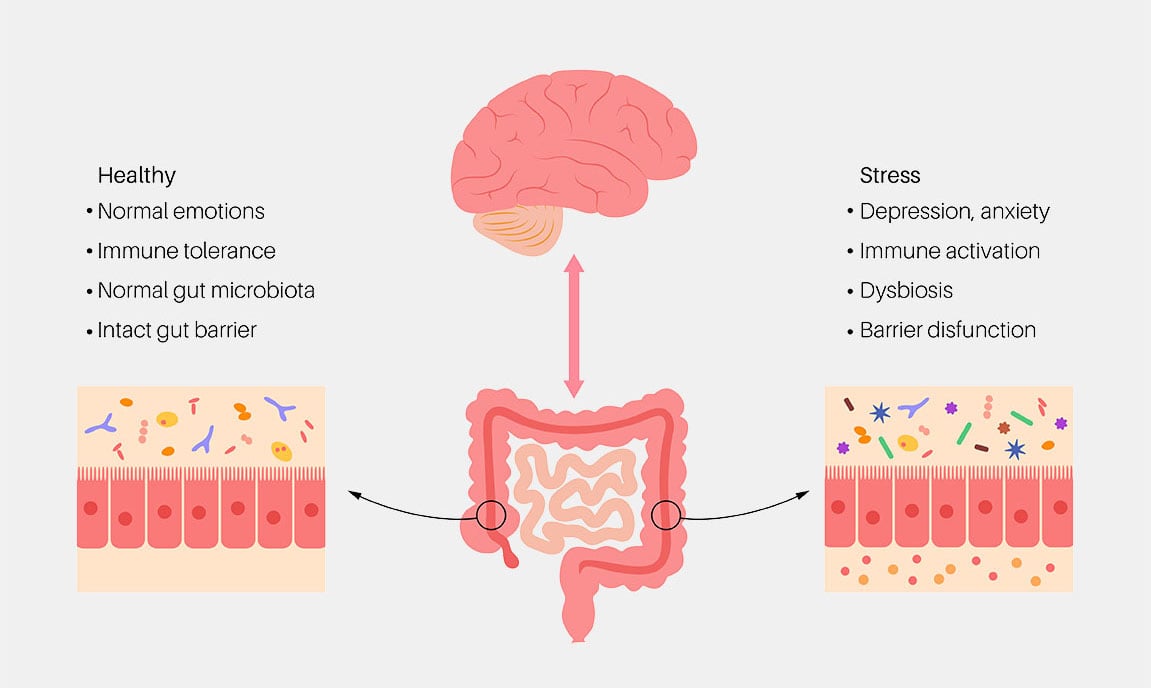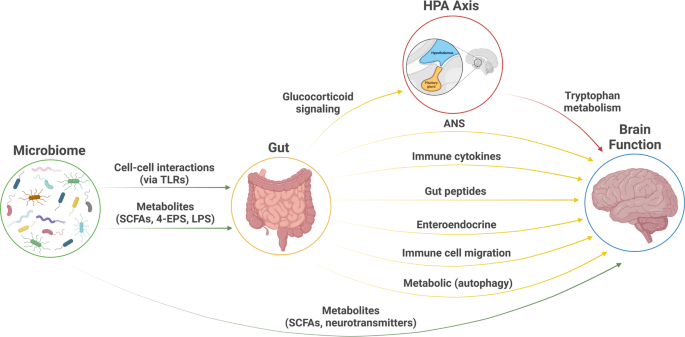
Psychobiotics: The Gut-Brain Connection in Mental Health
Discover how psychobiotics can revolutionize mental health through the gut-brain connection.Psychobiotics: The Gut-Brain Connection in Mental Health
Have you ever noticed how your mood seems to be connected to your gut? That butterflies-in-the-stomach feeling when you're nervous, or the way stress can upset your digestion? It turns out, there's a fascinating scientific reason behind this gut-brain connection - and it might just hold the key to revolutionizing how we approach mental health.
Enter psychobiotics - a cutting-edge field that's exploring how the trillions of microbes in our gut can influence our mind. As a nutritionist with a passion for neuroscience, I've been captivated by this emerging area of research. Let's dive into the world of psychobiotics and discover how your gut microbiome could be the secret to a happier, healthier mind.
What Are Psychobiotics?
Psychobiotics are live microorganisms that, when ingested in adequate amounts, produce a health benefit in patients suffering from psychiatric illness[1]. Essentially, they're probiotics with mental health benefits. But to understand how they work, we need to talk about the gut-brain axis.
Think of the gut-brain axis as a two-way superhighway between your digestive system and your brain. This complex communication network involves neural pathways, hormones, and the immune system. It's like a bustling information highway, constantly sending signals back and forth between your gut and your brain[1].
The Science Behind the Gut-Brain Connection
At the heart of this connection is the vagus nerve - the longest nerve in our body. It's like a direct hotline between the gut and the brain, transmitting information in both directions[2]. But that's not all. The microbes in our gut are busy little factories, producing neurotransmitters like serotonin, dopamine, and GABA - the very same chemicals that regulate our mood[3].

In my practice, I've seen how inflammation in the gut can lead to what we often call "brain fog." This isn't just anecdotal - research shows that gut inflammation can trigger inflammation in the brain, potentially contributing to conditions like depression and anxiety[4].
How Gut Health Influences Mental Well-being
The link between gut health and mental health is becoming clearer every day. Studies have shown that people with certain mental health disorders often have different gut bacteria compositions compared to healthy individuals[5]. It's like having a different cast of characters in your gut microbiome play.
Here's a mind-blowing fact: about 95% of our body's serotonin - often called the "happy hormone" - is produced in the gut[6]. No wonder our digestive system has such a profound impact on our mood!
Research and Studies
The field of psychobiotics is still young, but the research is promising. In one study, healthy volunteers who took a specific probiotic formulation for four weeks showed reduced levels of stress and anxiety[7]. Another study found that certain probiotics could alleviate symptoms of depression in patients with irritable bowel syndrome[8].

However, it's important to note that while these results are exciting, we're still in the early stages of understanding psychobiotics. More large-scale, long-term studies are needed to fully understand their potential.
Types of Psychobiotics
So, what are these magical microbes? Some of the most studied psychobiotic strains include Lactobacillus helveticus, Bifidobacterium longum, and Lactobacillus rhamnosus[9]. You can find these in fermented foods like yogurt, kefir, and sauerkraut. In my experience, incorporating a variety of fermented foods into your diet is a great way to support your gut microbiome.
Dietary Tips for Better Mental Health
Want to nourish your gut-brain connection? Here are some tips:
- Eat a diverse range of fruits and vegetables to feed your gut bacteria.
- Include fermented foods in your diet.
- Don't forget about prebiotics - foods like garlic, onions, and leeks that feed your good gut bacteria.
- Stay hydrated - your gut microbes need water too!
A sample gut-friendly meal might include a bowl of miso soup (fermented), a colorful salad with plenty of leafy greens and vegetables, and a side of kimchi. Delicious and nourishing for both your gut and your mind!
Lifestyle Factors that Affect Gut Health
Remember, it's not just about what you eat. Stress, sleep, and exercise all play crucial roles in maintaining a healthy gut microbiome. I often tell my clients that managing stress is just as important as eating well when it comes to gut health. Try incorporating stress-reduction techniques like meditation or yoga into your daily routine.
Potential Applications in Mental Health Treatment
The potential of psychobiotics in mental health treatment is exciting. While they shouldn't replace traditional therapies, they could be a valuable addition to existing treatments. Imagine a future where your psychiatrist prescribes not just medication, but also specific dietary changes to support your mental health!
Challenges and Limitations
Of course, as with any emerging field, there are challenges. The medical community is still somewhat skeptical, and we need more standardized research to fully understand how psychobiotics work. It's also worth noting that everyone's gut microbiome is unique - what works for one person might not work for another.
The Future of Psychobiotics
Despite these challenges, I believe the future of psychobiotics is bright. As we continue to unravel the mysteries of the gut-brain connection, we may be able to develop more targeted, personalized approaches to mental health care. It's an exciting time to be in this field!
Conclusion
The gut-brain connection reminds us that our body is an interconnected system. By taking care of our gut health, we're not just supporting our digestion - we're nurturing our mental well-being too. So the next time you're feeling down, remember - your gut might have something to say about it!
I encourage you to pay attention to your gut health. Try incorporating some fermented foods into your diet, manage your stress, and see how you feel. Your gut - and your mind - might just thank you for it!
Remember, while psychobiotics show promise, they're not a magic bullet. Always consult with a healthcare professional before making significant changes to your diet or treatment plan. Here's to a healthier gut and a happier mind!
References
- https://www.ncbi.nlm.nih.gov/pmc/articles/PMC4367209/
- https://www.ncbi.nlm.nih.gov/pmc/articles/PMC10384867/
- https://www.ncbi.nlm.nih.gov/pmc/articles/PMC5102282/
- https://www.npr.org/sections/shots-health-news/2024/06/24/nx-s1-5018044/gut-microbiome-microbes-mental-health-stress
- https://www.techtarget.com/pharmalifesciences/feature/Enhancing-Mental-Wellness-with-Psychobiotics-the-GutBrain-Connection
- https://amchara.com/diet-fasting/understanding-the-psychobiotic-diet/
- https://link.springer.com/article/10.1007/s12031-022-02053-3
- https://en.wikipedia.org/wiki/Gut%E2%80%93brain_axis
- https://foodguides.com/blogs/from-the-experts/the-psychobiotic-diet-a-new-nutrition-strategy-to-reduce-stress
- https://www.ncbi.nlm.nih.gov/pmc/articles/PMC10142889/
- https://www.ncbi.nlm.nih.gov/pmc/articles/PMC7767237/
Chronobiology and Personal Health: Optimizing Your Body's Natural Rhythms






Comments
No comments yet. Be the first to comment!
Leave a Comment